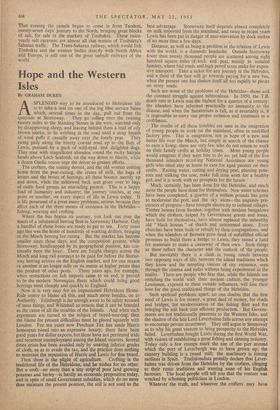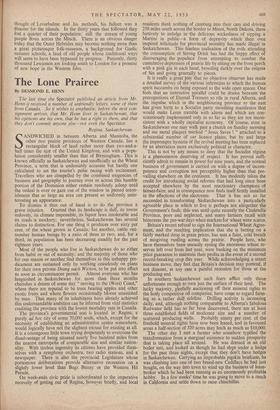Hope and the Western Isles
By GRAHAM DUKES ASPLENDID way to be introduced to Hebridean life is to take a seat on one of the big blue service buses which, several times in the day, pull out from the quayside at Stornoway. They go rolling over the twisting twenty miles to the Standing Stones in the west, watched only by disapproving sheep, and leaving behind them a trail of oily brown smoke, to lie writhing in the road until a stray breath of wind puffs it casually away over the lonely peat. They swing gaily along the breezy coastal road up to the Butt of Lewis, pursued by a pack of wild-eyed and delighted dogs. They roar with magnificent abandon round the rocky hairpin bends above Loch Seaforth, on the way down to Harris, while a dozen Gaelic voices urge the driver to greater efforts.
The crofters, the visiting dentist, and the old women coming home from the peat-cutting, the crates of milk, the bags of letters and the boxes of herrings, all these bounce merrily up and down, while the mildewed back seat given over to bags of cattle food groans an unavailing protest. This is a happy load of humanity and industry; the journey touches, at one point or another, on every aspect of life in Lewis today. It is life possessed of a great many problems, serious because they affect each of the three means of existence in the Hebrides— fishing, weaving and crofting.
Where the bus begins its journey, you look out over the masts of a substantial herring fleet in Stornoway Harbour. Only a handful of those boats are ready to put to sea. Forty years ago this was the home of hundreds of working drifters, bringing in the Minch herring for curing. But the market has become smaller since those days, and the competition greater, while Stornoway, handicapped by its geographical position, has con- tinually been the loser. There are freight charges across the Minch and long rail journeys to be paid for before the Storno- way herring arrives on the English market, and for one reason or another it no longer sells on its merits at higher prices than the product of other ports. Three years ago, for example, when restrictions on fish imports came to an end, 'it proved to be the modern Norwegian fleets which could bring good herrings most cheaply and quickly to England.
Now it is very easy for an impassioned Hebridean Home- Rule orator to blame all this, and much more besides, on to Authority. Edinburgh is far enough away to be slfely accused of most things, and Whitehall so remote that it can be branded as the cause of all the troubles of the Islands. And when such arguments are turned to the subject of tweed-weaving, then the blame for present difficulties must be placed squarely with London. For ten years now Purchase Tax has made Harris homespun tweed into an expensive luxury; there have been good years for dollar exports, but those have not prevented wide and recurrent unemployment among the Island weavers. Several times crisis has been avoided only by weaving inferior grades of cloth, so as to evade the tax, and the practice does nothing to maintain the reputation of. Harris and Lewis for fine tweed. Then there is the plight of agriculture. Crofting is the traditional life of the Hebridean, and he Wishes for no other. But a croft—no more than a tiny strip'of poor land growing potatoes and barley—is hardly an economic proposition today, and in spite of small Government subsidies, which do no more than maintain the present position, the soil is not used to the best advantage. Stornoway itself depends almost completely on milk imported from the mainland, and twice in recent years Lewis has been put in danger of near-starvation by dock strikes of no more than a few days.
Distance, as well as being a problem in the relation of Lewis with the world, is a domestic headache. Outside Stornoway fewer than twenty thousand people are scattered among eight hundred square miles of rock and peat, mainly in isolated hamlets, where bad roads and high petrol taxes make for expen- sive transport. Take a ticket for any journey in the Hebrides, and a third of the fare will go towards paying for a new bus, when the present one has shaken itself all too rapidly to pieces on stony roads.
Such are some of the problems of the Hebrides—those and the constant struggle against tuberculosis. In 1950, the T.B.
death rate in Lewis was the highest for a quarter of a century; the islanders have inherited practically no immunity to the disease, and when the Sanatorium is full, as it invariably is, it is impossible to carry out proper isolation and treatment in a crofthouse.
. The results of all these troubles are seen in the emigration of young people to work on the mainland, often in unskilled factory jobs. This is emigration, not in hope of a new and better life over the Minch, but simply in search of the chance to earn a living; there are very few who do not return to work on their family crofts at holiday times. More young people would emigrate if they were free to do so; yet half of the five thousand islanders receiVing National Assistance are young girls who must stay at home to care for aged parents on their crofts. Raising water, cutting and drying peat, planting pota- toes and milking the cow, make full time work for a healthy girl, and it is work with no prospects for the future.
Much, certainly, has been done, for the Hebrides, and much more the people have done for themselves. New water schemes have been completed, a quarter of a million pounds has gone to modernise the port, and the sky wires—the ungainly pre- cursors of progress—have brought electricity to isolated villages. Timber houses from Sweden, together with modern bungalows which the crofters, helped by Government grants and loans, have built for themselves, have almost replaced the unhealthy old " black houses " of thatch and untrimmed stone. Even churches have been built or rebuilt 'by their congregations; and when the islanders of Bernera grew tired of unfulfilled official promises to build them a bridge to Lewis, they raised a fund for materials to make a causeway of their own. Such things as these reflect the character and the outlook of the people.
But inevitably there is a clash in young minds between two opposing ways of life; between the island traditions which they know and the tempting visions of city existence, seen through the cinema and radio without being experienced in the reality. There are people who fear that, while the Islands are enriching the world with their ancient culture, the younger Lewismen, exposed to these outside influences, will lose their love for the good. traditional things of the Hebrides.
Such spiritual problems apart, no one doubts that the first need of Lewis is for money, a great deal of money, for rbads and bridges, for modernisation of the fishing fleet and for bringing the soil back into efficient production. But Govern- ments are not traditionally generous to the Western Isles, and the shadow of the late Lord Leverhulme falls across any.attempt to encourage private investment. They still argue in Stornoway as to why his great venture to bring prosperity,to the Hebrides failed. Leverhulme bought Lewis during the first World War, with visions of establishing a great fishing and canning industry. Today only a few stumps mark the site of the pier around which the port of Leverburgh was to have grown up; the cannery building is a tweed mill; the machinery is tinning sardines in Spain. Traditionalists proudly declare that Lever- hulme was driven from the Hebrides by the crofters, clinging to their rustic traditions and wanting none of his English factories. The local people will tell you that the venture was wrecked by scheming politicians in London.
Whatever the truth, and whatever the crofters may have thought of, Leverhulme and his methods, his failure was a disaster for the islands. In the thirty years that followed they lost a quarter of their population; still the stream of young people flows across the Minch. There is an obvious danger today that the Outer Hebrides may become nothing more than a great picturesque folk-museum, a background for Gaelic summer schools, a land of old people whose traditional ways` will seem to have been bypassed by progress. Patiently, thirty thousand Lewismen are looking south to London for a promise of new hope in the Western Isles.



































 Previous page
Previous page